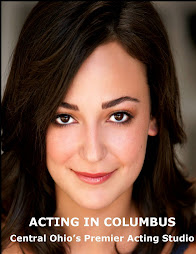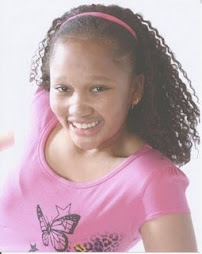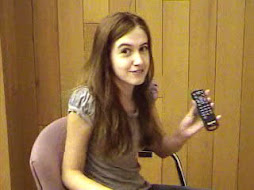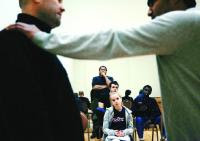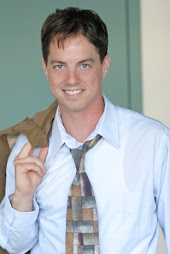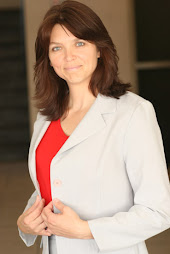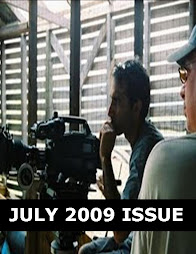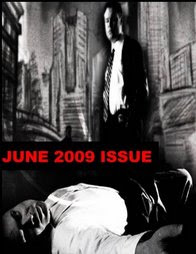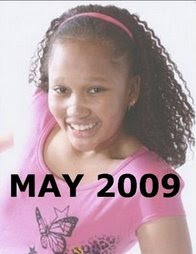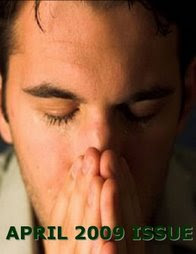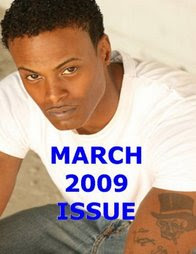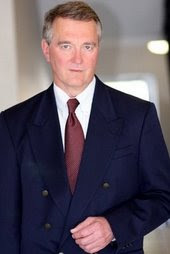Acting in Columbus presents the final scenes from the Eight-Week Acting for Film Scene Study Class for Beginners. We are very proud of the hard work and dedication each student put into their training. As you watch their performances, remember, none of them had any experience prior to taking this class - we believe you will find their work - very impressive!
Congratulations to all students who completed this session!
Part One
Part Two
MOST SEE THEATRE
 MADLAB THEATRE AND GALLERY PRESENTS
MADLAB THEATRE AND GALLERY PRESENTSTHE QUINTESSENTIAL ROULETTE
THE BEST OF THE LAST TEN YEARS
2009 marks the tenth anniversary of Theatre Roulette. To celebrate this, in August, MadLab will present the best play from each of the past 10 Theatre Roulettes. We let you decide, and the votes are in! Join us to see your all-time favorite plays from Columbus' longest running, annual shorts festival.
August 6th-29th, 2009 Thursdays-Saturdays $12 - General Admission $8 - Students/Seniors $6 - Members
 CHURCH Written by Young Jean Lee Directed by Matt Slaybaugh.
CHURCH Written by Young Jean Lee Directed by Matt Slaybaugh.Featuring Acacia Duncan, Eleni Papaleonardos, Ian Short, and Kate Watts.
Sound Design by Dave Wallingford.Lighting Design by Ryan Osborn.Stage Management by Michelle Whited.
PAY WHAT YOU WANT.Every seat, every show, for everyone.
All performances @Studio 2 @ the Vern Riffe Center.77 South High Street
Available Light takes on religion with the help of one of the American theater's most controversial voices, award winning playwright Young Jean Lee. Whether you're a believer or not, we dare you to experience the most inspiring and surreal church service of the year. You'll be talking about it for a long time to come.\
For more information click here: AVLTHEATRE
UPCOMING WORKSHOPS
Photo: Andrew K.


ACTING FOR FILM EIGHT-WEEK SCENE STUDY Acting Fundamentals for beginners
Wednesdays, beginning September 16, 2009 7:00pm-9:30pm $200
This class is limited to 12 students.
This class offers a focused introduction to the acting process. Beginning actors work, stage, and shoot several film scenes during the eight-week session. We work in depth on concepts central to the actor's role development for film. We use Shurtleff's 12 Guideposts as our basic text to help students make strong choices with a wide variety of scenes and monologues. Your ability to make active, personal choices.

Photo: Pandora C.
Advanced Acting for Film
Tuesdays beginning September 15, 2009 7:00pm-9:30pm $200
This class is limited to 12 students.
Here is your opportunity to take on more challenging scenes. To work with people who are serious about the work. This is an on-going, eight-week course designed to stretch your skills. Actors work, stage, and shoot several film scenes during the eight-week session. Scripts from soaps, sitcoms, dramatic TV and film are used. Actors receive a new scene each week to be prepared but not rehearsed in order to most closely reproduce the working situation in TV and Film.
For Intermediate and Advanced level actors.
Your final scenes will be screened for area Agents and Casting Directors.
HOW TO BECOME A VOICE-OVER ACTOR

The term comes from the world of film, when a narration was referred to in the script as "Voice Over Picture", or VO for short. Now, voice-over can refer to any number of ways you can use your voice to get a message across. You've heard about commercials, corporate narration and animation, but how about automated phone messaging, Automated Dialogue Replacement (also called "looping"), or reading for the blind? That automated message that calls you in the middle of dinner to say, "Hi, this is your credit card company calling with exciting news about your account." Someone was paid to read that. It could be you.
Voice-overs are a dynamic and flexible industry. You don't need a license or anyone's permission to do it. You can do it full time, or you can get started by auditioning and working in your spare time. Either way, you'll need dedication, creativity and an entrepreneurial spirit to succeed. You'll also need to learn to handle rejection. There are a lot of people in this business and you'll hear a good number of "No's" (or no answer at all) before you get that first job. You need a thick skin. Don't take the "No's" personally. Learn from it and move on to the next audition. With that said, there's always room for new talent, no matter your age, sex or "voice type".
It used to be that voice-overs was dominated by the big, booming "Voice of God" announcer style male voice, but the industry has changed. While men still have a slight edge on women in the industry, more and more women are taking on roles that have traditionally been for a "guy's voice". The split is estimated to be about 60-40 today. There's also a push away from those big announcer style voices. Producers today want a more natural, conversational delivery, like a trusted friend or the girl next door. What this means is, even if you don't have a resonant "radio voice", there's a place for you in the industry.
Voice-over is a who you know, not a what you know industry. Many jobs go to the voice actor who knows the producer or who is a customer of the client company. Often, getting one job creates opportunities for more jobs. It may seem unfair, but producers and clients like to work with people they know, people whom they already know will do a good job. We suggest you get an agent in oyur market and then think of expanding after you've gained some experience.
Voice-over is a very competitive business and there are more voice actors than there are jobs. Home recording and the wonders of the Internet have increased competition as well. On one hand, inexpensive recording equipment and online casting allow you to audition for jobs across the country or around the world. On the other hand, talent from across the country can audition for the same local jobs that you´d like to go for.
Voice-over is a very competitive business and there are more voice actors than there are jobs. Home recording and the wonders of the Internet have increased competition as well. On one hand, inexpensive recording equipment and online casting allow you to audition for jobs across the country or around the world. On the other hand, talent from across the country can audition for the same local jobs that you´d like to go for.
Speaking in broad terms, to get work as a voice actor you need four things...
1. An average sounding voice, with a wide range of styles.
2. Voice Acting Training.
3. A great demo reel.
4. An even better Talent Agent.
Susan Andre - Columbus based actress has over 20 years of acting and voice experience and is one of the most versatile, directable and creative voices on the national scene today, offers a great Voice-over Workshop that includes production of a Demo Reel. For more information, contact Susan at: http://www.susanandre.com/ .
UPCOMING AUDITIONS
 Columbus Children’s Theatre will hold OPEN AUDITIONS for THE WIZARD OF OZ
Columbus Children’s Theatre will hold OPEN AUDITIONS for THE WIZARD OF OZWHEN: Monday, August 10th & Tuesday, August 11th Youth 7:00 pm Adults 8:00 pm (Paid postions for adults only)
WHERE: Columbus Children’s Theatre512 N. Park Street
CALLBACKS will be on Wednesday, August 12th , 7:00 pm
CALLBACKS will be on Wednesday, August 12th , 7:00 pm
Directed by William Goldsmith, Music Direction by Jeff Hamm
• Actors should come with a prepared song and music. An accompanist will be provided. NO TAPES. • Actors should bring a current resume and a photo (snapshot is fine) and dress ready to dance.• Readings will be from the script. Scripts are available at our offices (177 E. Naghten St., Columbus, OH) and may be checked out for 3 days with a $20 deposit.
• Actors should come with a prepared song and music. An accompanist will be provided. NO TAPES. • Actors should bring a current resume and a photo (snapshot is fine) and dress ready to dance.• Readings will be from the script. Scripts are available at our offices (177 E. Naghten St., Columbus, OH) and may be checked out for 3 days with a $20 deposit.
Contact the theatre for more details: http://www.colschildrenstheatre.org/
 Audition at Curtain Players RUN FOR YOUR WIFE August 23 & 24, 2009 — ALL auditions take place at 7:00 p.m. at the theater on specified dates listed. If you have a resume and headshot, you can bring them, but they're not neccessary. It's what you can do on the stage that we're really looking for. If you have any questions, please write to info@curtainplayers.com or call the hotline at 614.360.1000. We look forward to seeing you at the theater!
Audition at Curtain Players RUN FOR YOUR WIFE August 23 & 24, 2009 — ALL auditions take place at 7:00 p.m. at the theater on specified dates listed. If you have a resume and headshot, you can bring them, but they're not neccessary. It's what you can do on the stage that we're really looking for. If you have any questions, please write to info@curtainplayers.com or call the hotline at 614.360.1000. We look forward to seeing you at the theater! Run For Your Wife by Ray Cooney Directed by Tim Browning Stage Manager: Lisa Billing Scenic Designer: Mark Rasche Producer: J. B. Jasiunas - Comedy
ABOUT Run For Your Wife: John Smith, a nondescript London taxi driver keeps a very precise schedule as he juggles two lives AND two wives – one in Wimbledon and one in Streatham. Complications arise when he suffers a blow to the head in an unfortunate handbag accident, and he divulges details to the hospital that seem to tell a strange story. Two detectives get suspicious and launch an investigation that make John’s life a living hell. John’s friend Stanley tries to help, but, of course, he’s too stupid and tries too hard and makes things worse. Did I mention that there’s an extremely gay neighbor upstairs dealing with a bathroom painting saga?
Performance dates are: October 23, 24, 30, 31, 2009 at 8:00 p.m.November 6 & 7, 2009 at 8:00 p.m.November 1 & 8, 2009 at 2:00 p.m. Rehearsals are typically Monday through Thursday evenings from 7:00 to approximately 10:00pm. Some weekend rehearsals may be needed if the work demands it. During Tech/dress rehearsal week, rehearsals will typically run from 6:30 to 10:30.
 Auditions for "On Golden Pond" By Ernest Thompson Director Tina Gleason. Performances: October 9 – October 24, 2009
Auditions for "On Golden Pond" By Ernest Thompson Director Tina Gleason. Performances: October 9 – October 24, 2009Auditions: Sunday, August 23, 2009 - 7:00 PM Monday, August4, 2009 - 7:00 PM Auditions will be reading from the script. In addition, a prepared monologue is required.
Bring Headshot and Resume if Available (not mandatory)Auditions will take place at the Emerald City Theater, 6799 Dublin Center Dr,in the Dublin Village Shopping Center.
Contact the theatre for more details: http://www.emeraldcityplayers.com/
WEEKEND ACTING BOOT CAMP

WEEKEND ACTING BOOT CAMP
Friday/Saturday/Sunday August 21-23, 2009 $275
Weekend Acting Boot Camp is designed for the beginner who want intensive training over a short period of time or the rusty actor who needs to get back on top of their game. Boot Camp will give you a strong foundation in acting techniques as well as a firm grasp of the nuts and bolts of scene work and audition skills.
Your Boot Camp will consist of no more than eight students who will discover together that acting is probably the most challenging and thrilling thing they have ever done. You will learn that if indeed this is for you and you stick with it, you will not only acquire a skill, but you will do something quite extraordinary with your life.
FRIDAY 7-9:30pm: Orientation Students will learn how to actively pursue objectives, creating character, and making choices based on the Super-Objective of the character.
SATURDAY 10am-6pm: Acting for Film/Scene Study
Begin work on subtext and objectives, gaining an understanding of the basic mechanics of playing a scene truthfully.
Audition/Cold Reading Techniques - Learn audition techniques that will help you get the part. Understand the audition process and learn what a casting director is looking for in an audition.
Getting a scene "cold", making powerful acting choices, listening and answering in the moment as you fully commit to your acting partner and your objective in the scene. Your auditions will be filmed and you'll receive feedback from the instructor.
SUNDAY 12-8pm: Acting for TV Commercials - Learn how to audition for and break into the local commercial and industrial industry. Experience with the actual audition process: You'll work on-camera all day doing both prepared and cold readings, and receive plenty of feedback from your instructor.
Your Boot Camp will consist of no more than eight students who will discover together that acting is probably the most challenging and thrilling thing they have ever done. You will learn that if indeed this is for you and you stick with it, you will not only acquire a skill, but you will do something quite extraordinary with your life.
FRIDAY 7-9:30pm: Orientation Students will learn how to actively pursue objectives, creating character, and making choices based on the Super-Objective of the character.
SATURDAY 10am-6pm: Acting for Film/Scene Study
Begin work on subtext and objectives, gaining an understanding of the basic mechanics of playing a scene truthfully.
Audition/Cold Reading Techniques - Learn audition techniques that will help you get the part. Understand the audition process and learn what a casting director is looking for in an audition.
Getting a scene "cold", making powerful acting choices, listening and answering in the moment as you fully commit to your acting partner and your objective in the scene. Your auditions will be filmed and you'll receive feedback from the instructor.
SUNDAY 12-8pm: Acting for TV Commercials - Learn how to audition for and break into the local commercial and industrial industry. Experience with the actual audition process: You'll work on-camera all day doing both prepared and cold readings, and receive plenty of feedback from your instructor.
This class is limited to eight (8) students. As of August 5, 2009 there are four (4) slots available.
CRAFTNOTES by ED HOOKS

Approach Avoidance - The Importance of Preparation
An experienced commercial airline pilot once told me about something called "approach avoidance". He explained that when a person is learning to fly a large aircraft, the most dangerous time is when landing. He must touch down at the right place and at the right speed, or he might taxi off the far end of the runway. A new pilot, he said, is sometimes afraid of landings and for this reason experiences "approach avoidance". Instead of touching down, he noses the aircraft back up and circles the airport again. The remedy for approach avoidance has to do with acquiring the confidence and mental focus to land the airplane. He has the knowledge; the obstacle is his emotions.
I flashed on that story recently while observing a couple of new actors prepare for a scene in class. One of them appeared to be working correctly, but the other one was jittery, mentally scattered. I knew by watching her behavior before the scene that she was going to have trouble in the scene. And so I am taking this opportunity to talk about those important moments immediately before an actor's entrance on stage, or before she hears "Action!" on a movie set.
The rule of thumb is that an actor has only to motivate entering a scene. He does not have to hold the entire upcoming scene in his brain while he is waiting to begin. Acting is not a wind-up toy. An actor enters and, once on stage, the circumstances of the play will ideally dictate what happens next. In other words, after his entrance, he strives to stay "in the present moment". As Laurence Olivier put it (I'm paraphrasing a bit), "You rehearse and rehearse and then, when you go on stage, you have to forget everything you rehearsed so that it can happen spontaneously."
The first requirement before an entrance is to be physically loose. Think of an Olympic swimmer immediately before the sound of the starting pistol. Every muscle is tuned and every part of her brain is focused. This feeling of being at ease is not the same thing as feeling relaxed. You are not going to sleep; you are about to perform. The physical sensation you are seeking is one of alert and focused readiness. Mentally, you want to be receptive - open - to what is about to happen.
Go ahead and get into character. Suppose, for example, your character is supposed to be drunk when he enters the scene. You don't want to wait until you are on stage to connect with the rhythms and physical effects of inebriation. Get into character and connect with why you are entering the scene. What do you want? What is your objective?
Acting choices that do not stimulate you emotionally are wasted acting choices. The moment before "Action!" is not the time to do a character analysis or start with rag-doll relaxation exercises. Connect with the impulse that will launch you into the scene. Mentally deliver yourself to the given circumstance. Scenes begin in the middle, remember, not at the beginning. Is there a strong emotion evoked when you connect with what happened prior to this entrance? Emotion tends to lead to action. Acting is a process of exposing, not of hiding.
Clearly, you are not going to be able to go through this kind of process if you are jittery and worried about what's going to happen once you get on stage. The idea is to replace those kind of thoughts with being in the moment. The correction for mental distraction is to re-direct what you are thinking about. You cannot relax by demanding of yourself that you relax. That will only make you more nervous.
Relaxation is a factor of your mind. Confidence manifests itself in a feeling of relaxation, and relaxation manifests itself in a feeling of weight, centered-ness. When you are confident, you feel solid, connected to the earth. You feel in control and at ease. Knowing why you are about to enter will make you feel confident. Just as that pilot must be "ready" to land his aircraft, and the swimmer must be ready for the race, an actor must be "ready" to perform. Success and failure are self-fulfilling prophecies.
BOOK OF THE MONTH

Sanford Meisner on Acting by Sanford Meisner
This book, written in collaboration with Dennis Longwell, follows an acting class of eight men and eight women for fifteen months, beginning with the most rudimentary exercises and ending with affecting and polished scenes from contemporary American plays. Throughout these pages Meisner is delight--always empathizing with his students and urging them onward, provoking emotion, laughter, and growing technical mastery from his charges. With an introduction by Sydney Pollack, director of "Out of Africa" and "Tootsie," who worked with Meisner for five years.
Subscribe to:
Posts (Atom)
